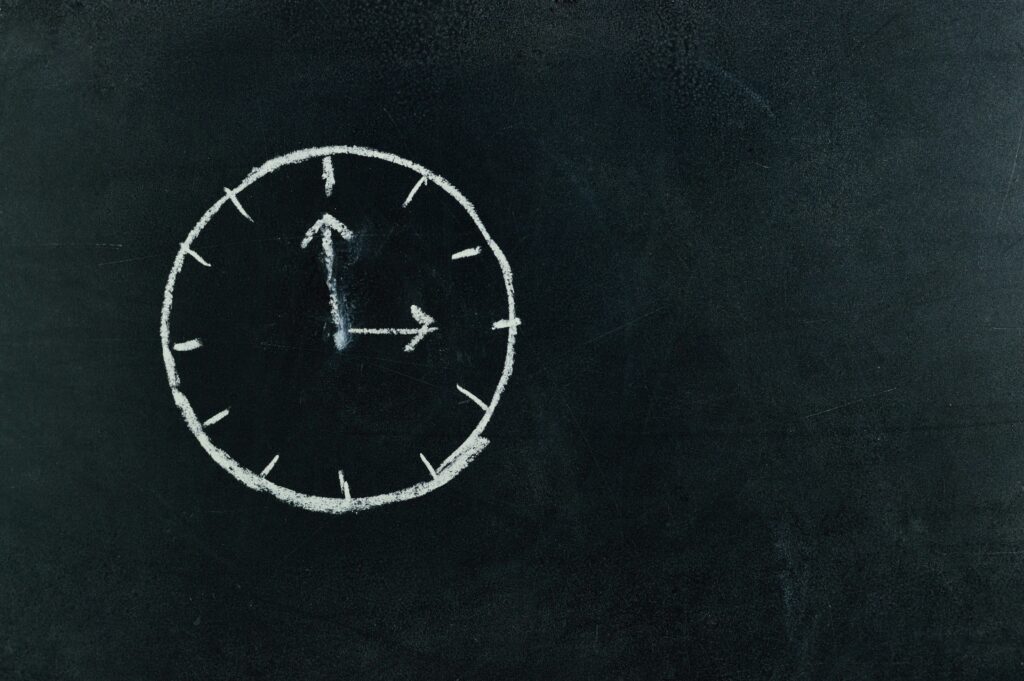
For the past several weeks, I’ve been re-entering the world of Duolingo. Since I first used the app about a decade ago, it has received a full makeover and many additional courses. It now includes math and music challenges, and I’ve been enjoying those a great deal. When you start a new course, the app asks a few preliminary questions about your level of practice with the subject. In math, I chose to start from the very beginning. At this point in my life, I’m well aware of my own educational neglect. While I was familiar with some basic math concepts, I was unfamiliar with others.
For example, I can finally read analog clocks.
I was about six years old when my parents taught me how to read analog clocks. This is an appropriate time to learn, but it left me baffled. They soon grew frustrated with me for not getting it in one sitting, so I stopped admitting how much I was struggling. After practicing on Duolingo at the age of 31, I’m able to see the time much more easily.
Most clocks are digital these days anyway, so what could it matter?
The problem is that this is how it went with just about everything. I was taught the bare minimum and was expected to teach myself from there. Recently I made the comment to a friend that I was undereducated, and they asked about what. After explaining that I was expected to teach myself and my younger siblings, and didn’t have much time to do that because I was so busy with other tasks, I finally said, “the list of things I was taught would be shorter than the list of things I wasn’t taught.”
I can remember off the top of my head how I was taught each subject from Kindergarten through 12th grade:
- How to read, Preschool (I was lucky to have a knack for it early)
- Bible study and memorization (LOTS of this)
- Math, grade 1 (“Math-It” was a set of instruction and flash cards that taught addition and multiplication, but not subtraction or division)
- Science, grade 1 (coloring pictures of basic body organs and taping them onto a poster of a body, and listening to mom read a book of devotionals about how god created the body to be amazing)
- Saxon Math, grades 4-7, pre-algebra – Ages 12-18 (textbooks that I was expected to teach myself from, and given the answer key to check my own work) (Also I knew I should have been learning Algebra 1 and 2 so I put those on my high school transcript, but I never got past Pre-Algebra)
- Grammar, grade 5 – Age 11 (one textbook, also self-taught)
- History/literature: listening to parents reading aloud – all ages (entirely historical fiction or propaganda)

I also had some extracurriculars:
- Debate and speech competition
- How to hunt and raise animals and process the meat
- Sewing (taught by other homeschool moms)
- Piano (taught by another homeschool mom)
I should also note that if we spent a day watching a children’s show that could be considered educational, my mom would say it “counted as doing school for the day.” This included Schoolhouse Rock, Popular Mechanics for Kids, and just about anything we were allowed to watch from the library. Bill Nye, for example, was not allowed because it wasn’t “Biblically accurate science.” The same went for most episodes of The Magic School Bus.
So, how much did I miss out on learning because I didn’t attend school before the age of 19? That list would be much, much longer than the one above. Here are just some of the things I still struggle with because I wasn’t taught well or at all:

- Basic Math
- Algebra and other advanced mathematics
- Parts of speech (nouns, verbs, etc., except for Schoolhouse Rock)
- Grammar, syntax, structure
- Literature, comprehension, and interpretation
- History (especially world history)
- Geography (especially world geography)
- How things work (my motto is idk how things work)
- The cell (mitochondria is a word I know but I really don’t know what it means)
- Red and white blood cells
- The body
- Photosynthesis
- Thesis statements
- Sex ed
Okay, so I didn’t learn a lot of things that most people are expected to. How does it impact me today?

I cannot overemphasize how little I know about the world, and how far behind it leaves me in pretty much any conversation. More than that, it set me up to fail when I reached college, because I had no idea what I was doing. I dropped out with a very poor GPA after five semesters of trying. While I can no longer do heavy physical labor due to my physical disability, my educational neglect was a major contributor in lost career opportunities. My first job was working for my dad, then I wrote content for friends of the family. After that job, I nannied and worked as a summer camp counselor, then worked in kitchens or grocery store delis, with a few call centers mixed in.
Remote work should be on the table, but I cannot deliver consistently due to physical and mental hurdles. I started going back to school in 2022, but was derailed in 2023 when my partner was diagnosed with a serious pulmonary illness, and we had to move. I do plan to return to school again when possible.
That leaves me with writing, and I write when I can. I’ve tried freelance writing multiple times, but freelancing clients expect specific guidelines to be met, and that I have the experience necessary to provide the work without training. I may be able to write my own blog posts, but blogging for someone else often requires venturing beyond my own knowledge. I may have been published on Huffington Post and Business Insider, but both of those articles had editors. Here on this blog, it’s just me and my story.
I wasn’t taught much. What I was taught, was either taught poorly or was propaganda. My experience is not uncommon among homeschooled children, despite what homeschooling advocates preach. Several of my siblings had a worse time of it, because they didn’t even learn to read until their teen years. My educational neglect has left me behind in countless ways. The least I can do now is let people know that educational neglect is a serious thing, that homeschooling can easily lead to it, and the impacts reach far.